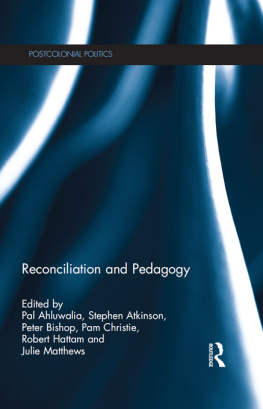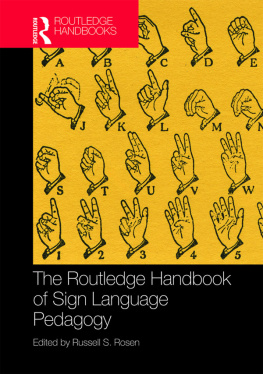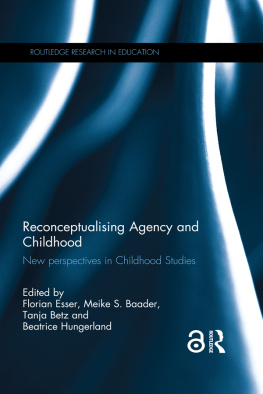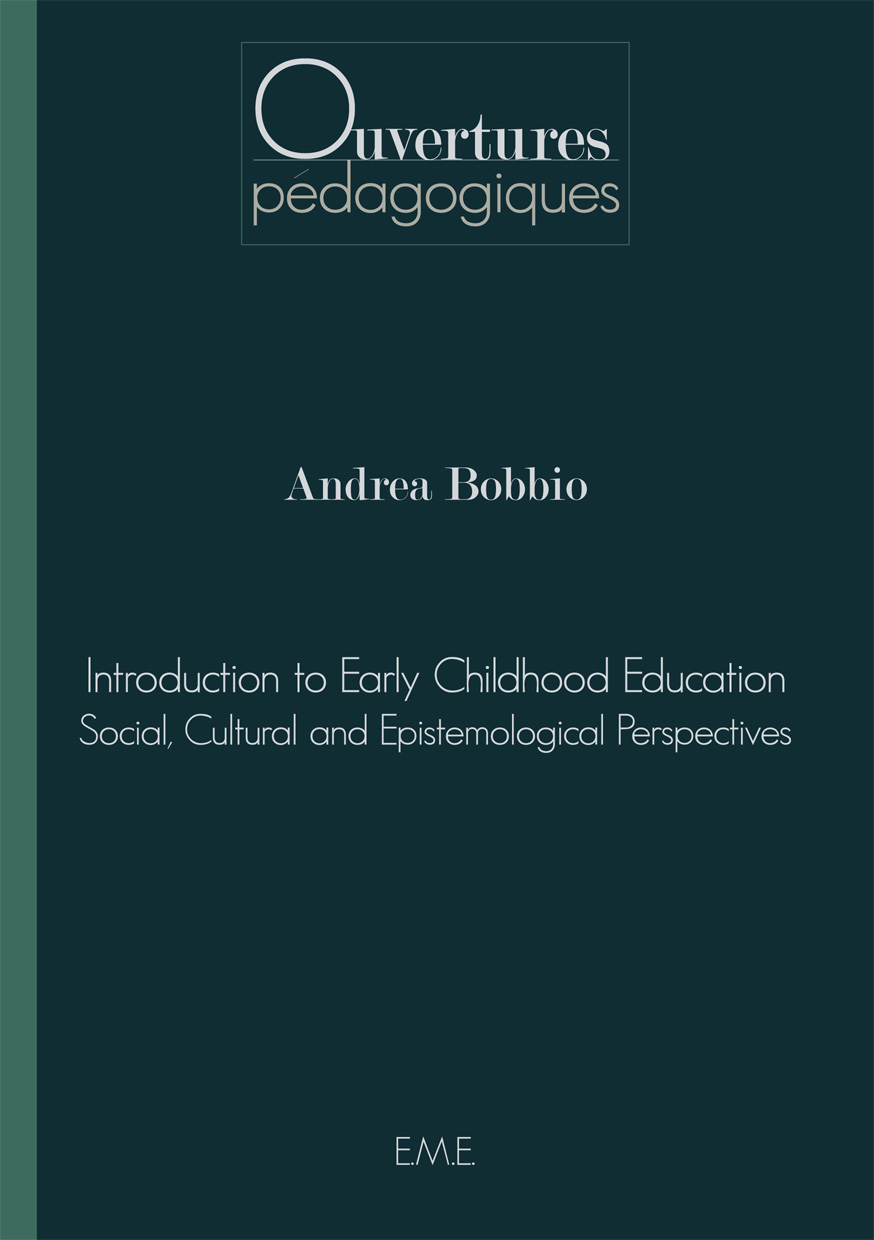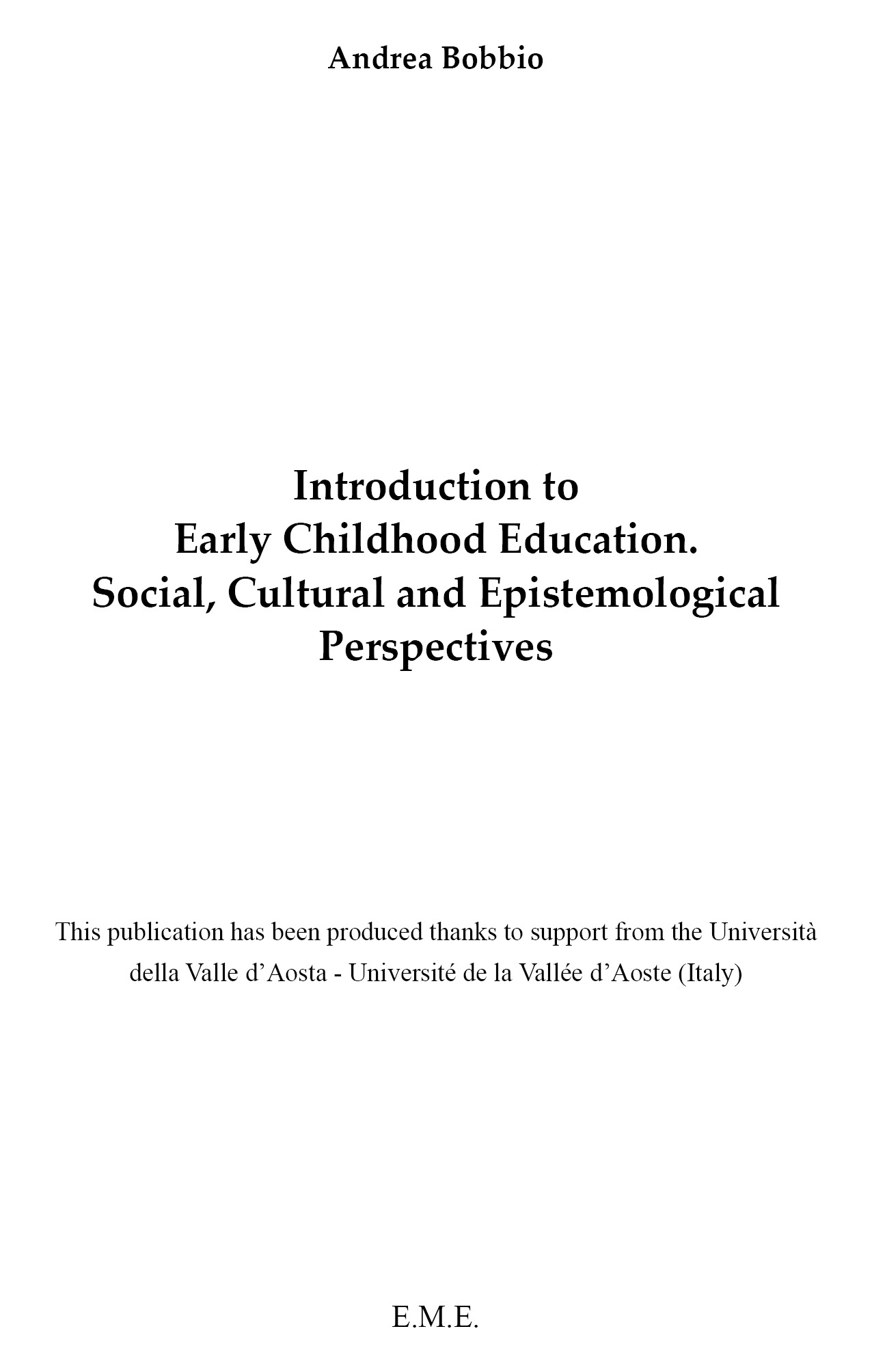Introduction
Teresa Grange
1. The context
The Italian childhood pedagogy has gradually developed an unconventional research method in the European pedagogical context, which is the result of that interrelationship between a philosophical framework (no longer connected to the hegemonic aims of Idealism .
Therefore, the cultural environment has restructured its own boundaries through various and multiple approaches to the matter. Starting from the main theories of philosophy of education that spread during the last century - such as the Thomistic philosophy (which developed from Personalism) - till the Problematicistic and the Phenomenological philosophy. Its framework is made up by contributions coming from different sources : the pedagogical source, that developed in the early kindergartens and then in the nursery working experience ; the pedagogy of engagement , whose heritage dates back to Montessori and the Agazzi sisters (with their different approaches to methodological dissemination ; magazines, documentation centres, university and scientific committees) and is still considered necessary in everydays pedagogy ; the historical-pedagogical school (see Egle Becchis and Domique Julias research on childhood as a social and historical-aimed experience) ; the neuro-psycho-pedagogical school , with the contribution both of phisicians (Bollea, Bernardi, Dolto in the Italian translation of Veggetti Finzi) and of educational psychologists (Petter, Scaparro).
These studies were critically regulated by the general pedagogy and were increased also by empirical approaches, that included qualitative research, both of interpretative and of cultural setting. The interrelationship of all those factors produced contributions, which collaterally (see studies on educational care, communication, educational relationship, education clinic) or in a more direct manner (see Paparella, Frabboni, Trisciuzzi, Cambi, Catarsi) faced the problem of the Puer (child) and his educability in an original manner. They didnt claim to solve the radical problematic nature of childhood that, today as ever, is placed between myth and enigma. In Italy, all these studies, if analysed from an academic point of view, didnt simply produce an educational system and the creation of a MA degree course for teachers training. The university system was prompted to question itself about the possibility to enhance the pedagogical features of job categories that once were considered less important (kindergarten teachers, nannies, other education and culture-related job categories) or related to other social science disciplines (clinical social workers, family counselors, pediatricians, nurses) that began radically innovative training programs for adults. Therefore, the appearance of a new cultural sensitivity increased a green pedagogy, an even more sensitive approach to the environmental sustainability and to the relationship between the child and nature. It promoted specific research on specific topics such as educational farms and country nursery schools. They were in a mutual relationship with studies on their assessment and on their validation on the pedagogical, didactic, organizational and procedural level.
2. Childhood pedagogy and social dynamics
A remarkable increase in the childhood pedagogical research, however, came from extra-academic cultural components. They acted as social unexpectedly complex archetypes if compared to the traditional patterns of child, family and educational agencies. We refer, particularly, to the globalisation-related phenomena that are strictly connected to their (inter)cultural implications. These phenomena issued a clearly strong educational need : migration processes (that show different approaches to childhood, relationship, intra-and intergenerational patterns) ; the presence of more than one cultural code, whose access, mediated by different media , is a prerogative of younger rather than older people. Adults are instructed on how to socialize by their children (or grandchildren), on how to approach new affiliation and citizenship forms ; such as the spread of uncontrolled consumerism and addiction patterns.
These dynamics partially bewildered the traditional power structures of the last century : the exercise of guardianship, the adults precautionary control over social messages, the governing attitude of adults over the children behavior during the whole educational process. The spontaneity on one hand and the ethical relativism on the other one allowed, therefore, the child to become the mentor of the adult. He (or she) has become the little oppressor which you have to conform to (on the basis of even more induced and enhanced needs), and then surrender, during his (or her) extended and never-ending adolescence.
These are common thoughts, all over the Western world. In Italy they have found a specific connotation in the childhood situation. On one hand it is subjected to even less effective forms of protection and on the other one it is compressed by family patterns. These juxtaposed the trapping and backward Amoral Familism (Donati) with other dissociated and confusing patterns. Altogether it took place in an highly individualistic social context marked by economic recession, low female employment rate, and by too modest, and heterogeneus, parenting reconciliation and support policies. For more than 20 years, the institutional sector has recorded a period of stagnation, which hasnt been followed by nationwide welfare-based forms of experimentation and reforms.
All this is causing both a real social and developmental crisis of childhood. It is focusing the attention on intergenerational equity and the childs sensitivity to cultural deprivation. In the long term, the last one is joined to the well-known phenomena of marginalisation and socio-cultural disadvantage .
Childhood is, therefore, a period of developmental difficulties that is not only intrinsic and physiological. They also depend on a set of causes that the ecology of human development has clearly shown by placing in a continuum the developmental elements, of dyadic and micro-systemic origin, with the social, cultural and political phenomena of macroeconomic relevance.
3. Cultural background and engagement
We outlined here both epistemological and cultural perspectives that could give to the Childhood pedagogy a large-scale investigation study and research background. We started a critical survey (and deconstruction) of the main childhood patterns - from the technomorph and hypermodern pattern until the intercultural anthro-pedagogy of childhood (the study of the different forms of folk pedagogy found in the various cultures and in the family educational patterns). The range of the various research innervates a number of prospective and further research both of hermeneutical and of experimental docimological assessment.
The book written by Andrea Bobbio, in its overall meaning, analyses methods and subjects, the sum of the main and most recent research issues rereading the effects - not only from the epistemological point of view - that the most recent literary production indicates as paradigmatic, as well as a cultural, anthropological and humanistic turning point.
Teresa Grange
Introduction of the author for the English translation
1. Trends and developments of the child education in Italy : an introductory view
The nowadays condition of the education as a general science of the formative and educational processes seems to be characterized by a consecutive line of the phenomena of the diversification and fragmentation. As a matter of fact, there has been a time in which the education phenomenon used to be up to the age of development ( paids , precisely). Such a stage has been followed by one in which the long life learning gives a specific formative meaning to every time and dimension of ones life, so that the terms of andragogy (referred to the adult education) and geragogy (referred to the old age education) are normally drawn close to the classical term of education.



